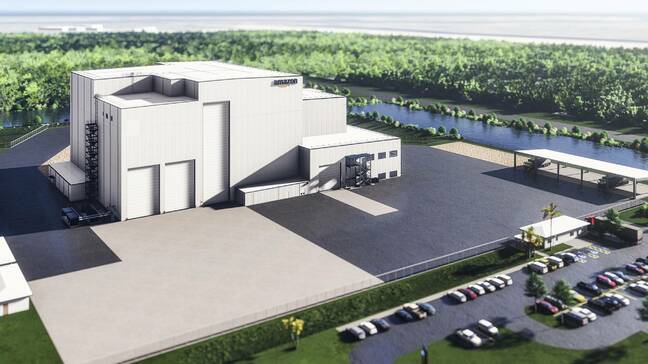Amazon sets up shop at Kennedy Space Center to prep Kuiper broadband satellites
Web super-biz dreams of lobbing 3,000-plus internet-relay birds into orbit
Amazon is building a $120 million facility at the Kennedy Space Center, on Florida's Cape Canaveral, where it'll prepare Project Kuiper internet-relaying satellites for launch.
The facility, already under construction at Space Florida's Launch and Landing Facility, will employ 50 workers, span 100,000 square feet, and feature a 100-foot-tall clean room to load the hardware into specialized dispensers, developed by Beyond Gravity, before they're carried up into low earth orbit (LEO).

Amazon's $120 million satellite processing facility under construction at the Kennedy Space Center will provide a staging area for Kuiper bird launches ... Source: Amazon. Click to enlarge
In all, Amazon plans to loft 3,200 satellites into LEO, where they'll compete with Elon Musk's Starlink constellation to beam broadband internet to under-served subscribers around the globe, and hopefully not further inconvenience astronomers.
Amazon says it will launch two prototypes "in the coming months" and has secured 77 launches with the United Launch Alliance (ULA), Blue Origin, and others. Blue Origin being the rocket biz set up by Amazon founder Jeff Bezos, natch. However, the two rockets highlighted in the release — the Blue Origin New Glenn and ULA's Vulcan Centaur — haven't actually made it off the ground yet.
The web giant hasn't started volume satellite production at its Kirkland, Washington facility yet either. According to the media statement, that won't happen until later this year. Meanwhile, the satellite processing facility in Florida is slated for completion early next year. Meanwhile SpaceX is already delivering orbital internet services.
- Amazon convinces FCC it can avoid space junk chaos
- Starlink's rocket speeds hit a 50 megabit wall for large downloads
- Amazon: Behold our antennas, which you cannot use just yet
- India takes second punt at soft lunar landing with launch of Chandrayaan-3 mission
With that said, Amazon is optimistic that the first production launches and trials will get off the ground sometime in 2024. Amazon's plan to keep the space over our heads clear of junk received the FCC's stamp of approval in February, clearing the way to begin deployments.
The first sats were supposed to lift off on the Vulcan Centaur earlier this year, but a mishap with the rocket in June delayed the launch until Q4.
But as we've seen with Starlink, it's going to take time to assemble a large enough constellation to provide global service in any meaningful way.
That hasn't stopped Amazon from pushing ahead with development of terrestrial infrastructure to support the satellite service. In March, the aspiring space internet service provider showed off three antennas, which can be used to tune into the satellite network, whenever they make it into orbit.
The mega-corp says the antennas will be capable of delivering respectable speeds of between 100Mb/s and 1Gb/s depending on the size of the terminal. We'll see. ®
 Biting the hand that feeds IT
Biting the hand that feeds IT